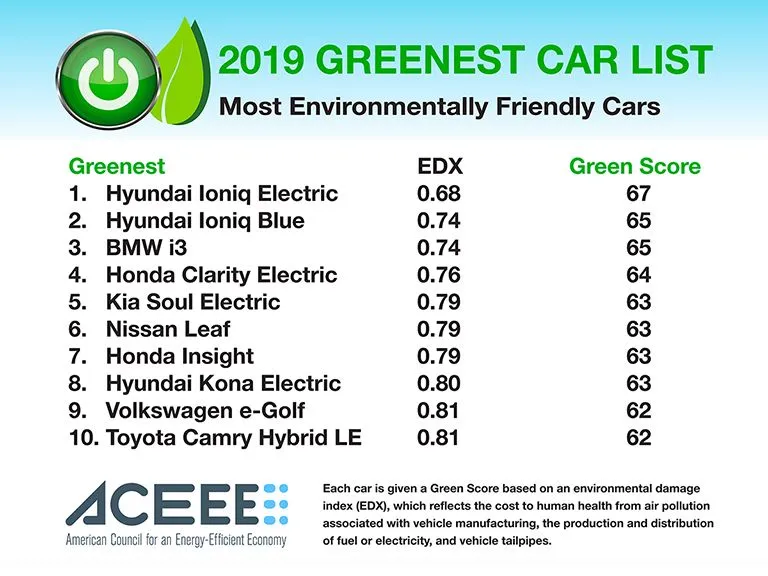
The ACEEE’s 2019 Greenist Car List: Hyundai Ioniq EV is #1
Each year, the American Council for an Energy Efficient Economy ranks the Greenest Vehicles. Each car is given a Green Score based on an environmental damage index (EDX), which reflects the cost to human health from air pollution associated with vehicle manufacturing, the production and distribution of fuel or electricity, and vehicle tailpipes.
January 23, 2019 / ACEEE Press Release:
“Vehicles with some form of electrification, whether hybrid or battery electric, continue to take every spot on the Greenest List,” said Eric Junga, senior transportation research analyst at ACEEE. “Despite a few automakers’ cutting back on their car fleets to focus on crossovers and SUVs, the Greenest List shows that many consumers have a range of good eco-friendly options.”
Scores for some battery electric and plug-in hybrid vehicles dropped since last year, the result of a change in the GreenerCars scoring model that updates the accounting of emissions associated with battery manufacturing. Even so, battery electric and gasoline hybrid models dominate the Greenest List, allowing consumers to minimize the environmental impacts of their next vehicle. The Hyundai Ioniq Electric holds its top spot for the third year, with a Green Score of 67. Other regulars include the BMW i3, Kia Soul Electric, and Nissan Leaf.
“By turning to clever vehicle designs and state-of-the-art batteries, automakers are making many of their offerings more efficient, at lower cost,” Junga said. He noted that all electric vehicles on the Greenest List start pricing below $45,000 before tax incentives, and most tout a rated driving range of over 150 miles, bringing EVs one step closer to becoming mainstream vehicles. Even though federal EV tax incentives have begun phasing out for some automakers, prices are dropping and state tax incentives may still be available. Consumers may want to inquire about incentives.
“As these vehicles rise in popularity,” added Junga, “it’s important to remember that the long-term benefit of EV ownership is not only in reduced fuel cost, but also in reduced lifetime environmental impact.” For those with requirements not quite met by current EV offerings, gasoline hybrids are a great alternative. Popular models make the Greenest List, including the Hyundai Ioniq Blue, a gasoline hybrid sibling to the first-place Ioniq Electric. Toyota’s mid-size Camry Hybrid LE is not only practical but boasts stellar fuel economy. Falling just short of the Greenest List and soon to be discontinued is Chevrolet’s plug-in Volt, one of Chevy’s most efficient models over its nine-year run.
For the fourth consecutive year, the Greenest List contains no vehicle with solely an internal combustion engine. Manufacturers continue to make impressive strides in the efficiency of gasoline engines, but adding even a small degree of electrification can further reduce a vehicle’s lifetime environmental impact despite the emissions from producing batteries.
Green Scores of the 1,200-plus model year 2019 vehicles are available for free in the greenercars.org interactive database, along with each configuration’s fuel economy, health-related pollution impacts, and greenhouse gas emissions. Visitors can also turn to GreenerCars scores to determine eligibility for parking benefits at participating LEED-certified buildings. Greenercars.org also features a write-up on model year 2019 market trends and shopping advice, as well as a consumer primer on vehicles and the environment.
Changes to this year’s methodology include updates to estimates of vehicle lifetime miles traveled, emissions associated with electricity production, and emissions from the manufacturing and recycling of vehicles and their components.
https://aceee.org/press/2019/01/evs-take-charge-greenest-list-auto
Recent Posts
- The 2022 Audi Q4 e-Tron SUV combines performance, practicality and luxury
- Ford's 2022 F150 Lightning All-Electric Truck is in high demand
- Legendary Audi performance is at the heart of the 2022 Audi e-tron GT and its RS sibling.
- Meet the Lexus RZ 450e – the luxury brand’s 1st EV
- The 2022 GV60 is Genesis’ first all-electric vehicle

